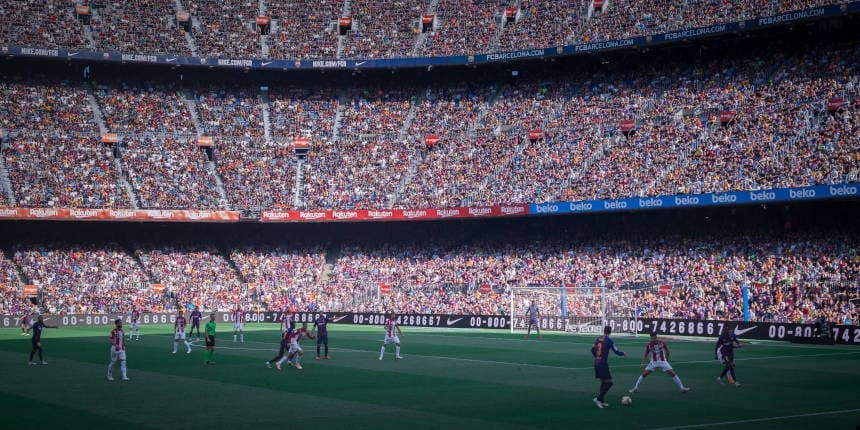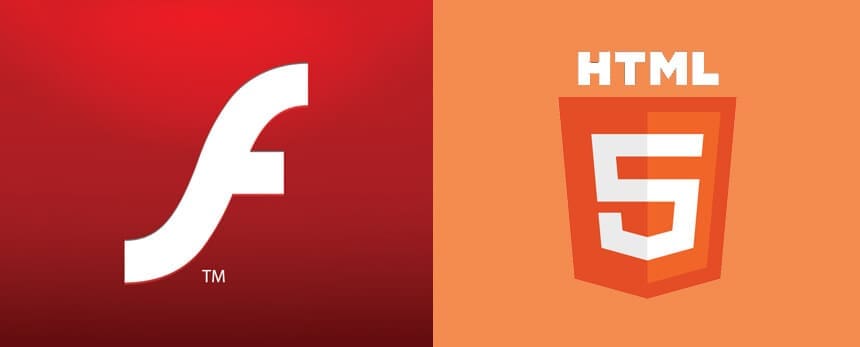
 Gone-in-a-flash-html5-leads-the-way...
Gone-in-a-flash-html5-leads-the-way... 
This post first appeared on the DAC Blog and was written by Patricia Whitney.
Ready or not, here it comes. Various groups in the digital community have been trying to say goodbye to Flash advertising for a long time. Flash ads have given us so much: rich, interactive brand experiences online, entertaining videos and games, and yes, even unwanted virus attacks. After hearing countless rumours about the Death of Flash, has the much-anticipated moment finally arrived? In early September 2015, we expect to see a number of web browsers and publishers contribute to the slow death of Flash across their properties. 
What lead us to this moment?
One of the more well-known events took place in April 2010 when Steve Jobs expressed his Thoughts on Flash, outlining why Apple does not allow Flash on iPhones, iPods and iPads. Earlier this year, Google announced that they would automatically convert eligible Flash campaigns in AdWords to HTML5 to “make it easier for marketers to deliver beautiful display ads that just work – regardless of screen or device – ensuring a better experience for both consumers and brands.” In June 2015, Google further announced that they would be launching an update to Chrome to “intelligently pause content (like Flash animation) that aren’t central to a webpage” providing a power-efficient web experience for consumers. Following this,Mozilla Firefox temporarily blocked Flash by default as a pre-emptive security measure after multiple vulnerabilities were exposed in early July 2015. Which brings us to the more recent event: the latest malvertising attack that abused Yahoo!’s ad network last week (if you want to learn more about how the attack happened, here’s an informative interview with Malwarebytes’ Jermore Segura).
The rise of HMTL5 Creative
With these in mind, it’s easy to see the benefits of converting from Flash creative to HTML5: • HTML5 creative is less resource intensive, requiring less power to run and resulting in longer-lasting laptop and device battery power • Increased usage of HTML5 ads can result in a decrease in malware attacks via Flash ads (although we shouldn’t rule out all attacks by eliminating Flash, hackers will continue to find alternatives) • Advertisers will be able to continue delivering rich brand experiences online; static banners will not be the sole creative option • HTML5 creative will cater to the growing population of HTML5 adopters on both desktop and mobile devices:  How is the industry responding? Publishers In speaking with a number of major publishers, we’ve heard overwhelming HTML5-supportive responses: • GOOGLE As one would expect, Google has been actively preparing for this movement. They have launched Google Web Designer to assist advertisers, designers and developers in their transition to HTML5 creative development. Google has also developed a Rich Media Gallery to offer a variety of tools and support material to aid in the switch to HTML5. In addition, Google’s Swiffy tool confirms when Flash creative will be converted automatically in AdWords, so long as creative assets are uploaded as .swf or Adobe Flash version 9 or older. • YAHOO! According to AdAge, Yahoo! took action as soon as it learned of the malvertising attack and similar to Google, Yahoo! shows its support for HTML5 creative through their HTML5 General Guidelines. • MOZILLA FIREFOX Very shortly after its temporary ‘Flash block’, Firefox made the decision to run Flash again, claiming “the block was never meant to be permanent and that the firm always planned to end it when Adobe fixed the software’s security.” • DYNAMIC CREATIVE A dynamic creative partner recently confirmed that they offer mobile- and tablet-friendly versions of dynamic options (HTML5) and have been doing so since the early days of HTML5 development. • AGENCY TRADING DESK Our preferred agency trading desk has indicated that the ability for their platform to host HTML5 creative is on their development roadmap; in the meantime, HTML5 creative is accepted via third-party ad tags. Advertisers Advertisers have generally been supportive of and responsive to the HTML5 transition. Clients have provided HTML5 creative replacements for campaigns and have actively supported our recommendations to convert existing Flash creative to HTML5. Advertisers can access IAB’s wiki for a variety of HTML5 digital advertising resources. Our POV and recommendation Embrace HTML5! We – marketers and consumers alike – live in a multi-device, multi-channel world. The ways in which we interact and consume content are heavily reliant on the devices we access daily. In order for brands to reach and connect with consumers effectively, this must be taken into consideration. Converting to HTML5 is, of course, just a small part of how brands should approach digital advertising. A number of creative options are still available and they should be weighed against the goals of your campaigns. Animated ads have the potential to tell a great brand story or announce a new product launch – if that’s the message you want to get across. On the other hand, clear and concise static banners will reduce any distraction from your call-to-action, thereby positively influencing direct response and conversion. Don’t forget that native, paid social and text ads also play a role in your digital media mix. Often times, these will take top position in your highest-converting campaigns, and they feature the simplest forms of visuals: ad copy and static images. Content marketing also has powerful organic impacts to your brand. Taking an active approach to content creation will support and boost your digital efforts. The bottom line Staying focused on who you are trying to reach and the action(s) you would like them to take will guide you to the most optimal solutions for your business. Like any marketing effort, a client-centric approach is what’s important to ensure your opportunities are not gone in a flash. Image source: juni.com,eMarketer
How is the industry responding? Publishers In speaking with a number of major publishers, we’ve heard overwhelming HTML5-supportive responses: • GOOGLE As one would expect, Google has been actively preparing for this movement. They have launched Google Web Designer to assist advertisers, designers and developers in their transition to HTML5 creative development. Google has also developed a Rich Media Gallery to offer a variety of tools and support material to aid in the switch to HTML5. In addition, Google’s Swiffy tool confirms when Flash creative will be converted automatically in AdWords, so long as creative assets are uploaded as .swf or Adobe Flash version 9 or older. • YAHOO! According to AdAge, Yahoo! took action as soon as it learned of the malvertising attack and similar to Google, Yahoo! shows its support for HTML5 creative through their HTML5 General Guidelines. • MOZILLA FIREFOX Very shortly after its temporary ‘Flash block’, Firefox made the decision to run Flash again, claiming “the block was never meant to be permanent and that the firm always planned to end it when Adobe fixed the software’s security.” • DYNAMIC CREATIVE A dynamic creative partner recently confirmed that they offer mobile- and tablet-friendly versions of dynamic options (HTML5) and have been doing so since the early days of HTML5 development. • AGENCY TRADING DESK Our preferred agency trading desk has indicated that the ability for their platform to host HTML5 creative is on their development roadmap; in the meantime, HTML5 creative is accepted via third-party ad tags. Advertisers Advertisers have generally been supportive of and responsive to the HTML5 transition. Clients have provided HTML5 creative replacements for campaigns and have actively supported our recommendations to convert existing Flash creative to HTML5. Advertisers can access IAB’s wiki for a variety of HTML5 digital advertising resources. Our POV and recommendation Embrace HTML5! We – marketers and consumers alike – live in a multi-device, multi-channel world. The ways in which we interact and consume content are heavily reliant on the devices we access daily. In order for brands to reach and connect with consumers effectively, this must be taken into consideration. Converting to HTML5 is, of course, just a small part of how brands should approach digital advertising. A number of creative options are still available and they should be weighed against the goals of your campaigns. Animated ads have the potential to tell a great brand story or announce a new product launch – if that’s the message you want to get across. On the other hand, clear and concise static banners will reduce any distraction from your call-to-action, thereby positively influencing direct response and conversion. Don’t forget that native, paid social and text ads also play a role in your digital media mix. Often times, these will take top position in your highest-converting campaigns, and they feature the simplest forms of visuals: ad copy and static images. Content marketing also has powerful organic impacts to your brand. Taking an active approach to content creation will support and boost your digital efforts. The bottom line Staying focused on who you are trying to reach and the action(s) you would like them to take will guide you to the most optimal solutions for your business. Like any marketing effort, a client-centric approach is what’s important to ensure your opportunities are not gone in a flash. Image source: juni.com,eMarketer

